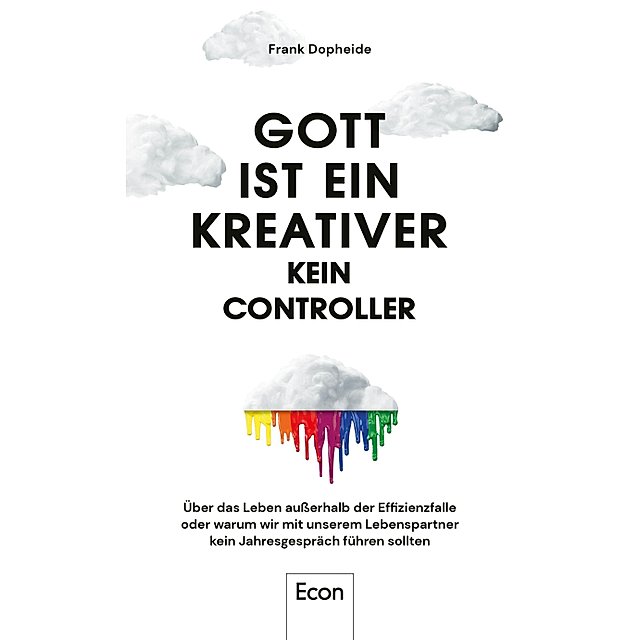Frank Dopheide, Founder of human unlimited, author and absolute brand expert is with us today in the interview. But not only our joint interview is published today. Frank’s book “God is a creative, not a controller” also goes on the market today and we are already very excited to read it. Find out in the interview what is behind Frank and his foundation of human unlimited, so you will clearly see the connection to the book.
Hi Frank, with your ‘purpose agency’ you clearly stand for a values mindset. What are the values you personally stand for? Which values are crucial for founders?
Imagination has become an important resource and is of great importance. For the first time in human history, technology has overtaken human imagination. It used to be different: Jules Verne imagined the journey to the moon, and barely a hundred years later, it came to be. Meanwhile, there is quantum computing, blockchain and much more. Even if someone explains it to us, we have no picture of it. And because we can no longer imagine how the world will become, we are nervous.
You don’t just need computers that can calculate anything. If you think they are intelligent, you are wrong! They only calculate. Apart from zero and one, they have nothing in their heads – we do. For us, AI means creative intelligence. We need more creativity.
For me personally, the highest value is freedom. I personally stand up for that. But we, and especially founders, need other values to be fit for the future. Appreciation, responsibility, inspiration and courage are important for us.
You founded a purpose agency and the term is on everyone’s lips. In your view, is the term currently overused?
Totally overused. I can’t hear the term anymore. Why has this happened? Because the term is old, used up and has the wrong connotation. The mistake is in the understanding. In 2007, when I was chairman of GREY, I had a report on Procter & Gamble on my desk. They had studied what really differentiates brands. It said, “It’s not what people buy, it’s what they buy into.” Brands don’t just have to say what they do, but what they do something for. In 2007, Procter started developing advertising derived from that. Before that, there were product demos: “How much liquid fits in a diaper?” After that came, “Parents want their babies to be okay, no matter where.” That was Purpose, and everyone copied that. Every liverwurst, every jam now has that. But that was at the product level and thus became a sales pitch. But I understand Purpose to be something different. For me, it’s about understanding why a company exists in the first place: “The Reason For Being”. That is the soul of a company. Mark Twain said a great thing: “The two most important days of your life are the day you’re born and the day you discover what for.” That means founders need to know what their company is for.

Why do many entrepreneurs find it difficult to take a stand?
Milton Friedman, economist and winner of the Nobel Prize for Economics, shaped the economy with his shareholder theory and the slogan “The business of business is business”. He claimed that a company has no social responsibility to the public or society. In my view, this was fatal, because many entrepreneurs took their cue from it and focused their attention only on numbers.
In the meantime, there is often a decisive difference between entrepreneurs and managers: Entrepreneurs consider their immediate environment. When they change something, it has a direct impact on their personal experience and self-perception. Big managers no longer have that. In addition, managers and, to a lesser extent, entrepreneurs have learned over time that communication is a minefield. This has been exacerbated by the pressure generated by social media, among other things. As a result, the voice of business, beyond one’s own company, has become increasingly quiet and inaudible. Attitude is therefore rarely found today, and that has to change.
What has to change? What must make an entrepreneur?
Entrepreneurs fulfill two criteria: They not only have a business plan, but a concrete idea of their company. They also have an insane feel for their company and the market. They still create something.
It is often difficult when external managers are placed at desks of a self-made leader. They can optimize, but they can’t invent anything new. Most of the time they can’t get out of their thinking bubble. Let’s take a look at the automotive industry, for example: No new car is being invented there. They have long since gotten the best out of it and accept that. But when was the last time something truly innovative was created? That’s where we need to get back to.
The CEO of Campus Founders, Oliver Hanisch, spent 14 years in Silicon Valley, has now come to Heilbronn and brought a new spirit with him. What do you think we can learn from the American way of life?
“How big can you dream?” That’s the most important driver in America for winning people over, acquiring new money and generating attention.
Germany works differently. Some choose the old engineering variant: “I have a product idea here. How could it be improved?”. The others are already thinking about the exit when they are founded, in order to make money as quickly as possible. They have no inner driver other than becoming a founder. This is definitely the wrong approach.
The Americans have a lot more tailwind because of their whole culture, because of Hollywood, because of storytelling and their receptiveness to these topics. We can learn from this: we need playful, light, creative elements and, of course, the opportunities to found, i.e. spaces, funds and supporters from the business world. I think that would do us good. When we bring things together that don’t really belong together, new things emerge, but to do that we have to dream.
2020 was not an easy year and also the founding year of your agency. What did you learn about yourself and your agency?
I found that 2020 was an accelerator for topics that are important to me and us as an agency. For some things, it was foreseeable beforehand that they had no future. They’ve come closer to the precipice again. It was interesting to see ‘purpose’ take on a new meaning at the highest levels of the business. It’s now landed on the executive desk and everyone realizes that there’s no way we can continue with the existing business models and the old recipes for success and that we have to reinvent ourselves. This is an opportunity for the entire startup scene.
What is your view of the startup scene in Germany in general?
I think it’s better than people think, but it’s not visible enough. The people are well educated, smart and committed. That alone is not enough. We have too few heroes, hardly any leading figures and stories to tell. There are not enough creative, free spaces.
For me, the scene has two major weaknesses. Startups are somewhat closed off and don’t take place in real life. For example, a health startup belongs in the middle of a university hospital, talking to nurses, patients, and doctors every day. It needs the chance encounters, the spirit of the industry, the exchange with the world.
In addition, Germany lacks the determination to make financial investments. We are characterized by evolutionary progress, but the future will not work that way. With the really big companies, it was not evolution, but revolution.
But nobody dares to do that here. If, for example, someone had invented beaming and approached Lufthansa and said, “We swear to you, it’s possible. We need 200 million euros for it. We don’t quite have it yet, but we will make it.” The response would hardly be, “That sounds like exactly our business. You’ll get the money.” It is likely that no one would even say, “With 2.5 million euros, we’re in!” just to keep their finger on the pulse.
What advice would you give to young people who have an idea for a startup?
It’s striking that the good startups have a product idea and often not much else. They have bad names, mediocre logos and no idea of their actual story. There is no plan on how they are going to sell it and how to make the business pitch. They lose power, energy, money, and opportunities as a result. If the basics aren’t right, it takes more and more energy with each passing day to make up for it. My tip is to get someone on board from the beginning to help think these things through. Don’t think small, think big first, then take three steps back to reality and dare.
You need both: an accelerator to help you dream and someone to package the idea well and make it communicable.

Zu Frank:
Frank Dopheide studied at the Sports University to become, surprisingly, a copywriter at Spiess, Ermisch, Abels. He sprinted up the career ladder to become the first creative to become Chairman of GREY Worldwide in 2005. He led GREY into the top ten most creative agencies and won the first ‘Lion’ in agency history. In 2011, Frank Dopheide founded Deutsche Markenarbeit, which focuses on managers as brands. In August 2014, the Handelsblatt publishing group joined Deutsche Markenarbeit as majority shareholder. He is considered one of the best-known brand experts in the country. Frank Dopheide became the management spokesman for the Handelsblatt Media Group and drove its transformation into the most innovative media company in the German-speaking world. He sold his shares in the company to become a young entrepreneur once again in 2020. Through his new venture, Human Unlimited, he gives meaning to companies and ensures sustainable growth of trust capital, corporate value and social acceptance. His clients include Deutsche Bank, Unicredit, Telekom, Telefonica, Würth, Douglas, Traton, Kienbaum, Galeria Karstadt/Kaufhof, Stepstone, Bayer 04 Leverkusen. The agency is based in the Medienhafen in Düsseldorf. The brand promise is “Creative Intelligence on Purpose”.
Frank Dopheide also wrote the children’s book “Die Strahler” (The Spotlights), which describes the adventures of seriously ill children in a hospital and won the red dot award.
His new book “God is a Creative. Not a Controller” was published today and you can get it here for example: https://bit.ly/30KhEgZ
He is married and has three children and a golden retriever.
Thank you Frank for the great interview. We are excited about your book and hope that we could inspire some members of our #founderscommunity!